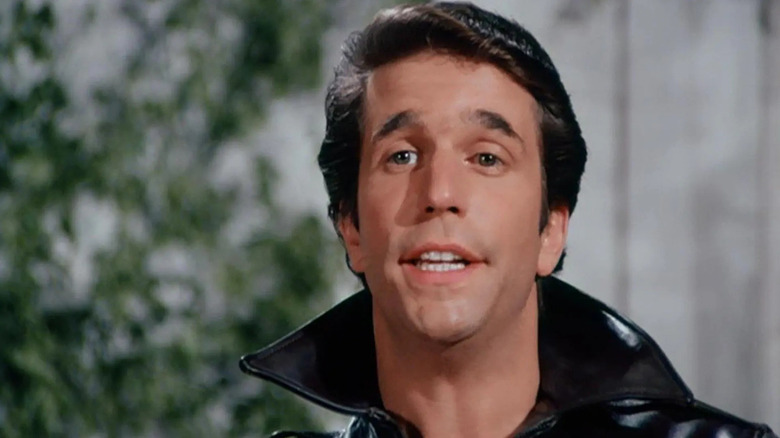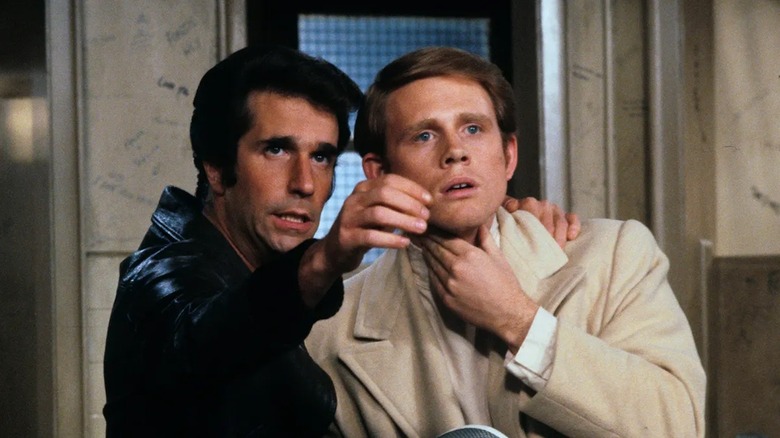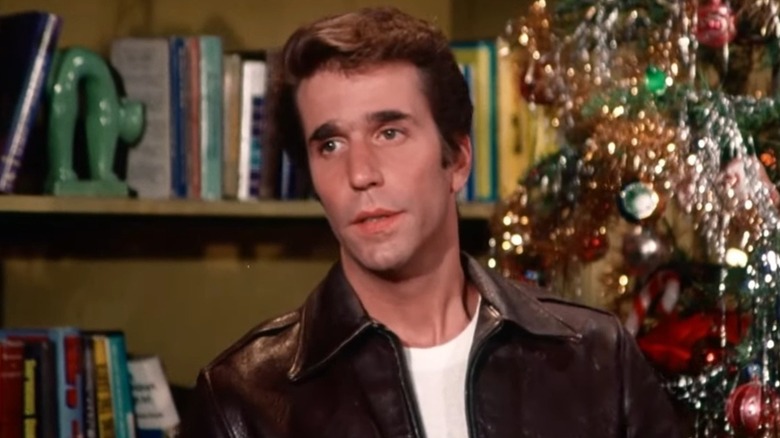The Happy Days Changes That Saved The Show From An Early Cancellation
We may receive a commission on purchases made from links.
Garry Marshall's sitcom "Happy Days" provided ABC with a welcome ratings boost when it premiered as a mid-season replacement on January 15, 1974. To say its success was surprising would be to ignore the blockbuster elephant in the room that was "American Graffiti," George Lucas' coming-of-age comedy that tore up the box office the year prior by exploiting Baby Boomer nostalgia for growing up amid the rise of rock-and-roll and cruising culture in the 1950s and '60s. Many members of this generation had reached parenting age and, as such, welcomed any opportunity to escape from their day jobs and child-rearing and remember their carefree days of sucking down milkshakes at their local diner and slamming coins into the jukebox.
While "Happy Days" was a ratings hit at first, ranking number 16 in the Nielsen ratings after its first season, the show encountered some seriously unexpected viewership turbulence when it received direct time-slot competition from the "All in the Family" spinoff "Good Times." Suddenly, the well-liked series that had vaulted Henry Winkler to television stardom as the cool, kind-hearted greaser Arthur "Fonzie" Fonzarelli was struggling to stay in the Nielsen's top 50. ABC sounded the alarm and let Marshall know that a third-season renewal hung in the balance.
Marshall, who broke into the business as a 26 year old writer on "The Jack Paar Show," dug deep into his bag of tricks and came up with one significant stylistic adjustment that would, if nothing else, give each episode a surge of energy. The network had other notes for Marshall, some of which he shot down. But his instincts and collaborative spirit helped save a cultural institution from a shockingly abrupt cancellation.
Rather than make Fonzie the star, Happy Days made him part of the Cunningham family
The stereotypical network executive approach to saving a troubled show is to identify which elements of a given series seem to be working and push them to the fore. In the cast of "Happy Days," there was no doubt that Winkler's Fonzie was not just a breakout character but also a pop cultural sensation. He was cool, charismatic, and, in the context of the show, hilarious. ABC TV honcho Fred Silverman pushed to retitle the show "Fonzie's Happy Days," which would've presumably busted the show's ostensible protagonist, Richie Cunningham (Ron Howard), down to a supporting character and, perhaps, relegated the entire Cunningham family to recurring status.
Ron Howard pushed back against this. The showbiz veteran, who'd been mentored for the better part of a decade by Andy Griffith, could hold his own with meddling suits. He told them in no uncertain terms that he would walk from the suddenly struggling series if they turned it into a star vehicle for Winkler. Fortunately for Howard and the health of the show, Winkler was on the same page as his co-star.
In the newly released book "50 Years of Happy Days: A Visual History of an American Television Classic," authors Brian Levant and Fred Fox Jr. remember Winkler selflessly pleading with the ABC brass to not make him the solitary star of the series. According to Fox, "Henry told them, 'No, no, you don't get it. The show is about my relationship with the family. You take me away from the family, you don't have much.' And Barbara Marshall [Garry's sister] told us that if the title had changed, Garry Marshall himself would have left."
ABC backed down, which allowed Marshall to build on the family theme that would power the series through 11 seasons. "Instead of spinning Fonzie off," said Levant, "Marshall deepened his integration into the Cunningham family by having him move into an apartment above their garage, literally and symbolically giving him a seat at the dinner table. It gave him a reason to be even more involved with their family. Pretty simple fixes when you look at it, and the audience went nuts."
And Levant could say this about "the audience" because "Happy Days" made one other major change to give the series a jolt of life.
Happy Days was filmed in front of a live studio audience
Marshall knew one sure-fire way to jumpstart the flagging energy of "Happy Days" was to borrow a trick from the sitcom version of "The Odd Couple," for which Marshall had written before he developed "Happy Days." Like that show, "Happy Days" began its life as a single-camera sitcom with no audience. Marshall gambled that transitioning to a three-camera format with a live studio audience might kick the show into overdrive.
If you've watched "Happy Days," you know that the wildly responsive studio audience was practically a character on the series. They exploded with applause and whistles when Fonzie made his entrance and spread the love to just about all of the main players. When the show was cooking, you could sense the building enthusiasm of a fan base that, according to Levant and Fox, lined up once a week outside of the Paramount lot to hopefully guarantee themselves a seat in the studio. "Becoming an audience-driven show unleashed the actors' personalities," said Levant. "Under Jerry Paris' direction, the third season, the fourth season —they just sizzled with energy."
This made "Happy Days" feel like an event. If you weren't tuned in, you were missing out. And if Marshall hadn't made the aforementioned alterations, we all would've missed out — which might've thrown a wrench into Robin Williams' career.


